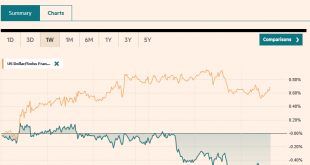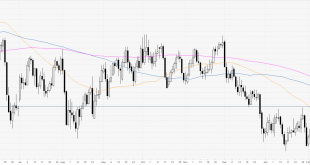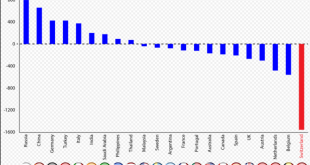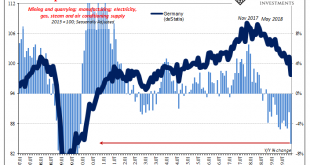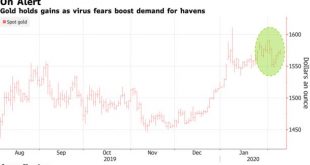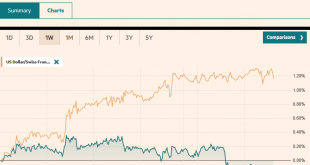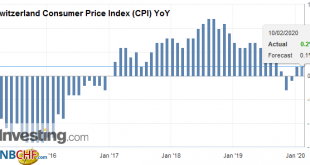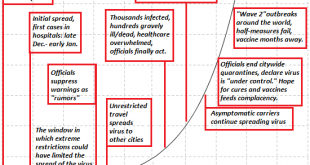Swiss Franc The Euro has fallen by 0.08% to 1.064 EUR/CHF and USD/CHF, February 12(see more posts on EUR/CHF, USD/CHF, ) Source: markets.ft.com - Click to enlarge FX Rates Overview: Investors appear to be increasingly looking past the latest coronavirus from China as new afflictions slow. Despite the soggy close of US equities yesterday, Asia Pacific bourses are nearly all higher, led by more than 1% gains in Singapore and Thailand. The Dow Jones Stoxx 600 is...
Read More »USD/CHF Price Analysis: Rising wedge can halt the bulls
USD/CHF created a rising wedge pattern suggesting potential exhaustion in the medium term. The level to beat for bears is the 0.9770 support. USD/CHF daily chart USD/CHF is pulling back down slightly from the 2020 highs while reintegrating Friday’s range. The spot is trading below the 100/200-day simple moving averages suggesting an overall bearish bias. USD/CHF daily chart(see more posts on USD/CHF, ) - Click to enlarge USD/CHF four-hour chart USD/CHF is...
Read More »L’or de la Banque Nationale suisse
Note: Ce post est une erreur. Son contenu correspond en fait à la page dédiée à l’or suisse de la banque centrale. https://lilianeheldkhawam.com/lor-de-la-banque-nationale-suisse/ Cette erreur est intervenue dans le cadre de la création de la page sur la Monnaie, que je vous invite à visiter ici: https://lilianeheldkhawam.com/monnaie-dossier/ Avec mes excuses. LHK Change in Central Bank Gold Reserves by Country - Click to enlarge...
Read More »As the Data Comes In, 2019 Really Did End Badly
The coronavirus began during December, but in its early stages no one knew a thing about it. It wasn’t until January 1 that health authorities in China closed the Huanan Seafood Wholesale Market after initially determining some wild animals sold there might have been the source of a pneumonia-like outbreak. On January 5, the Wuhan Municipal Health Commission issued a statement saying it wasn’t SARS or MERS, and that the spreading disease would be probed. In other...
Read More »Gold Consolidates Near Six Year Record Highs At $1574/oz; WHO’s ‘Tip of the Iceberg’ Virus Warning
via Bloomberg Gold climbed for a fourth day as investors weighed the unfolding coronavirus crisis, including a stark warning from the head of the World Health Organization about the potential for more cases beyond China and signs the disease is spreading in the key Asian trading hub of Singapore. Prices rose as the death toll from the outbreak topped 900 and WHO Director-General Tedros Adhanom Ghebreyesus voiced concern over the spread from people with no travel...
Read More »Europe Can’t Afford a New “Green Deal”
Today’s brand of the left-leaning politician is all about substituting what sounds good for what actually works. Modern politics, whether in the US or Europe, is about taking a chainsaw to everything that produced even a modicum of success to appease the deities espousing progressive orthodoxy. There is no better example of this than fossil fuels, an energy source that has lifted us out of destitution and darkness, and given us incredible wealth that the world had...
Read More »FX Daily, February 11: New Calm in the Capital Markets Continues, Powell Moves to Center Stage
Swiss Franc The Euro has risen by 0.15% to 1.0675 EUR/CHF and USD/CHF, February 11(see more posts on EUR/CHF, USD/CHF, ) Source: markets.ft.com - Click to enlarge FX Rates Overview: Investors are taking solace from reports indicating that the increase in the new coronavirus at ground zero (Hubei) is slowing. After the S&P 500 reversed early losses yesterday to close at new record highs helped keep the bullish sentiment intact. Benchmarks in Hong Kong, South...
Read More »Swiss Consumer Price Index in January 2020: +0.2 percent YoY, +0.2 percent MoM
10.02.2020 – The consumer price index (CPI) fell by 0.2% in January 2020 compared with the previous month, reach-ing 101.5 points (December 2015 = 100). Inflation was +0.2% compared with the same month of the previous year. These are the results of the Federal Statistical Office (FSO). The decrease of 0.2% compared with the previous month can be explained by several factors including falling prices for clothing and footwear due to seasonal sales. The prices for...
Read More »Grossbanken – Fünf valable Kandidaten für Rohner-Nachfolge als CS-Präsident
Urs Rohner, VR-Präsident der Credit Suisse. Bild: ZVG Nach der Absetzung von Tidjan Thiam als operativer Chef der Credit Suisse wurde von verschiedenen Seiten auch gefordert, dass VR-Präsident Urs Rohner bereits auf die kommende Generalversammlung hin seinen Hut nimmt, so etwa vom Stimmrechtsberater Ethos. Rohner will sich aber an der kommenden GV von Ende April für ein letztes Jahr noch einmal wählen lassen. Im Jahr 2021 sollte er dann altershalber zurücktreten. Die...
Read More »China’s Fatal Dilemma
Ending the limited quarantine and falsely proclaiming China safe for visitors and business travelers will only re-introduce the virus to workplaces and infect foreigners. China faces an inescapably fatal dilemma: to save its economy from collapse, China’s leadership must end the quarantines soon and declare China “safe for travel and open for business” to the rest of the world. But since 5+ million people left Wuhan to go home for New Years, dispersing throughout...
Read More » SNB & CHF
SNB & CHF

